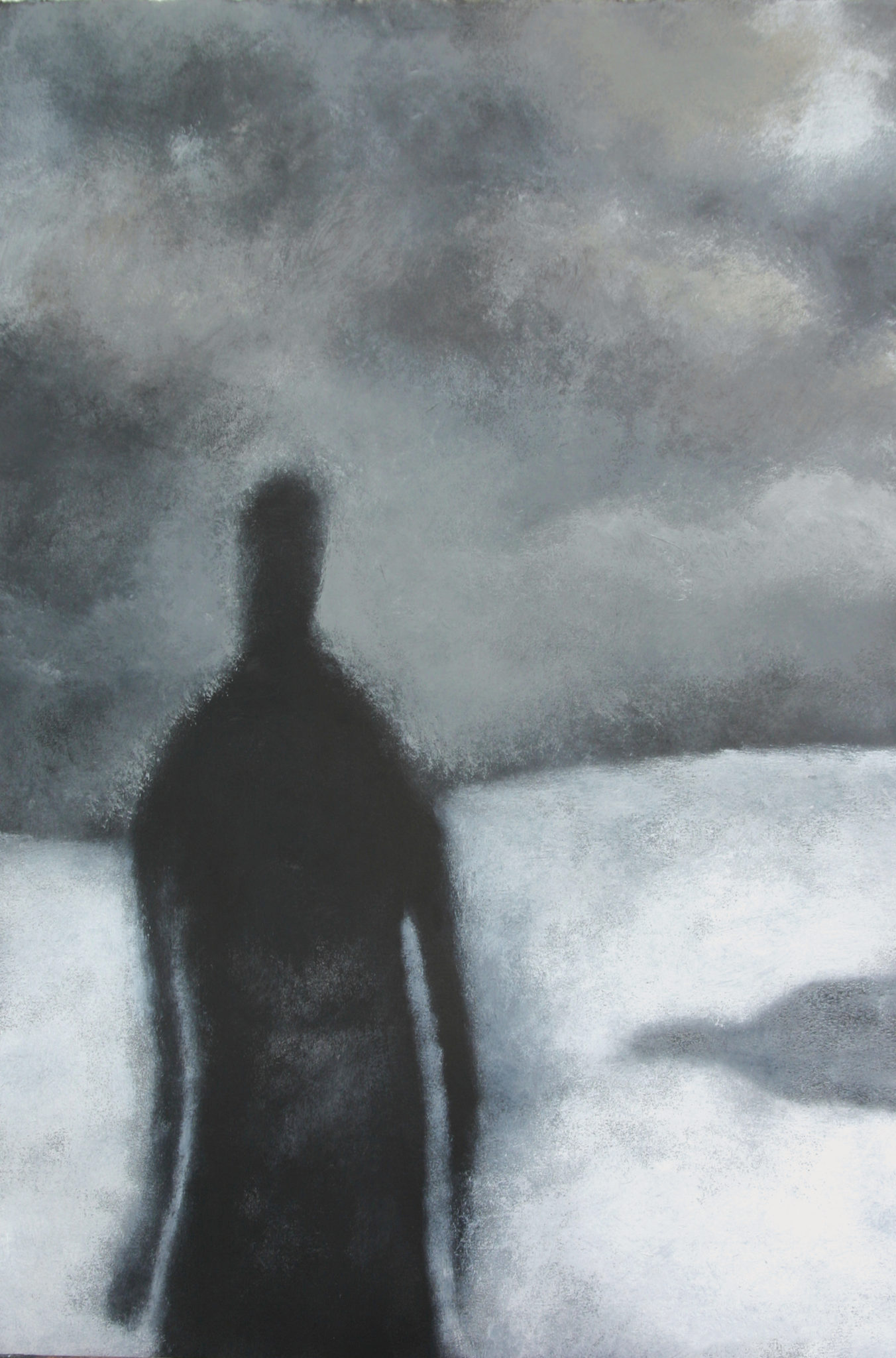
Our Blue Period
When clinical depression strikes a marriage, the cracks are long and deep.

A version of this story ran in the December 2015 issue.

It was a beautiful morning, just a few months after our wedding. My husband was sitting in the garden room doing nothing in particular — except crying. We were both 24 and living in Fort Worth, where we’d grown up.
“Oh my gosh, what’s wrong?” I asked, rushing into the room.
“I don’t know,” he said. “I just can’t stop crying.”
My immediate fear was that he regretted marrying me — regretted it so much that it caused him to sob uncontrollably. Now, I wish it had been that simple.
Sitting beside him in the garden room, I held his hand, stroked his thick brown hair and told him, “Everything is going to be OK. Don’t worry, I love you.”
I’ve always been irrepressibly optimistic, but that bright outlook has dimmed a bit since our wedding in 2004. Back then, I was sure I could help my husband. He needed saving, and I took on the job with unthinking exuberance. A few months after our wedding, I finally convinced him to see a counselor: My husband was diagnosed with clinical depression, which is often chronic over a lifetime due to its biochemical nature. The counselor persuaded him to start taking antidepressants, and that helped — for a while.
My husband and I met in 1997, during our senior year at Haltom High School in Fort Worth. We sat beside each other in class and traded pencils and notes. I tried to touch his hand with every opportunity. I was smitten, and there was a lot to love. He was incredibly smart, with plans for medical school, and he was a nationally ranked swimmer with colleges wooing him. His quiet confidence was his most attractive quality. He strolled the halls of our high school in cut-off khakis, wild Hawaiian-print T-shirts and flip-flops.
Between high school and college, the person I loved started dying. It was a slow death at first, almost unrecognizable as such, masked by a thick layer of booze and the hilarity and antics of youth. For men, clinical depression often strikes in the early to mid-20s, according to mental health professionals. For my husband, that event occurred at Southern Illinois University when he was 20 years old. He started withdrawing, sleeping more and skipping class. Though he didn’t think much about it then, he now sees this behavior for the harbinger that it was. I thought he was just getting lazy, staying up drinking too late. He did that a lot, but then, so did I. Everyone did, which made his first real episode of depression seem like no more than a long hangover.
Later, when we were engaged, I should have recognized the signs; they were so typical of a major depressive disorder. He lost weight, and he was pessimistic, anxious and less confident. But I just assumed he wasn’t a naturally upbeat person, and I believed that I could be happy enough for both of us.
People with clinical depression are wired differently. In a neurotypical brain, mood-regulating neurotransmitters, such as serotonin, noradrenaline and dopamine, carry signals from one nerve cell to another. It’s generally accepted that in the brains of depressed people, those signals are disrupted or depleted. Antidepressants boost and regulate neurotransmitters, and at first they worked for my husband. He took a medication that affects serotonin levels, and he started going to counseling twice a month.
Within a few months, I felt like he was back — like we were back. We bought a house in Arlington. He got a new job that paid more and shortened his commute. He socialized with some of his old high school friends, and we got busy planning a life together. At night, we would lie in bed and talk about our day. “What are you thinking about?” I’d ask. He hated those questions, maybe because he was afraid of what I would come to understand if he answered.
The years that followed my husband’s initial diagnosis were filled with denial, misunderstanding and a maddening silence that grew more oppressive with every missed conversation and slammed door.
For people who don’t live with mental illness, perpetual sadness is hard to understand. My mom used to say, “He can walk. He’s smart. He’s got food to eat. He should be thankful.” I spent hours trying to convince him that he should be happy, that the world is full of endless, beautiful possibilities. But the seriously depressed can’t be reasoned into happiness.
Each year, 6.7 percent of U.S. adults experience major depression, according to the National Institute of Mental Health. Women are 70 percent more likely to become depressed than men, but men are less likely to seek treatment. Depression’s most damaging effect on people — besides hopelessness and fatigue — is that it changes their thought process and worldview, according to Jane Hickerson, a licensed clinical social worker and assistant dean of field education at the University of Texas at Arlington School of Social Work. Optimism is replaced with pessimism, she says, and logic is thrown out the window.
In his acclaimed book, The Noonday Demon: An Atlas of Depression, Andrew Solomon writes: “When you are depressed, the past and future are absorbed entirely by the present moment, as in the world of a three-year-old. You cannot remember a time when you felt better, at least not clearly; and you certainly cannot imagine a future time when you will feel better. … The most important thing to remember about depression is this: You do not get the time back. It is not tacked on at the end of your life to make up for the disaster years. Whatever time is eaten by a depression is gone forever.”
For me, the years that followed my husband’s initial diagnosis were filled with denial, misunderstanding and a maddening silence that grew more oppressive with every missed conversation and slammed door. On the occasions when my husband opened up and told me how he was feeling, his words scared me so much that he stopped talking. I wish I’d been able to be stoic, offering a poker face and reassurance, when he said that sometimes he wanted to die and that I’d be better off without him. Instead, I started treating him less like an adult and more like a sick child.
Four years into our marriage, I knew he wasn’t capable of giving me the emotional support and connection I craved. Trying to get it from him created more problems and stress. So I built a new support system by reaching out to people I hadn’t seen in years, and investing more time in the friendships I’d maintained. I started working on myself, going to counseling to figure out what I wanted to do with my life. These survival tactics worked for about five years. I got used to not getting what I needed from my husband and being disappointed with him. Then, before I realized what was happening, resentment set in.
We got married on June 11, 2004, and it was perfect. I shoved cake into his mouth at the reception and he wiped icing on my lips. We danced to “Brown Eyed Girl” by Van Morrison and “At Last” by Etta James. We promised not to go to bed angry and to never (ever) get a divorce.
Couples cross an invisible line when they use the word “divorce” as a weapon in an argument. After that, it becomes a possibility, and both partners can see the exit sign. I can’t remember the first time we used the word. But I can remember how most of our arguments ended: My husband would yell, “I’m done!” and leave the room or the house. At first, that killed me. I felt crazy with anger and sadness. With time, I became used to it.
Once, in 2009, when we were living in Haltom City, I ran to his car and forcibly held open his door so he couldn’t drive away. In an otherwise quiet cul-de-sac in the middle of the night, we were in our driveway, screaming. I was so upset, I didn’t care.
The negative impact of mental health disorders on marriage is pretty much incontrovertible. A study published in the American Journal of Psychiatry found that people with psychiatric disorders, including major depression and anxiety, predating their first marriage were 12 percent more likely to get a divorce than people without them. Add that to a divorce rate of 40 percent, and wedding bells lose their luster.
My husband’s depression was sucking away my happiness. Hickerson says being married to a person with chronic depression is like trying to save someone who is drowning. You can’t let him drag you down, regardless of how much you want to save him. At the end of the day, or at the end of a marriage, you can only sacrifice so much of your own well-being.
In my late 20s, I started thinking about leaving my husband. It wasn’t until age 31 that I was ready. He was experiencing another bad episode of depression, probably his third or fourth in our marriage; each lasted a few months and created permanent damage between us. This time, he stopped talking. I filled dinners with wine and music instead of conversation. I stopped trying to engage him in upcoming events or socializing with friends. He was stoic under his thick beard. His kind, chocolate-colored eyes revealed nothing but sadness. It was like his soul had been stolen, and he didn’t have the energy to find it. I was tired of being with somebody who hated life.
If sadness could kill, I would have died there — sprawled on commercial-grade carpet outside the office of our 60-something counselor.
In March 2011, in the bathroom, I saw two blue lines on a plastic stick. I looked out the window in stunned disbelief. I was pregnant.
I had planned to move to Peru and work for a magazine, learn Spanish and date throngs of handsome South American men. Instead, I decided to stay, not just in the country but also with my husband.
It was a smart choice. My daughter is the best thing in my life. She makes every day magical. The pregnancy brought my husband and me together, and our marriage was infused with new hope. During the first months of parenthood, my husband was with me every step of the way. We watched YouTube videos on breastfeeding in the wee hours of the morning while trying to get our daughter to sleep. He comforted and calmed me when I felt trapped in the combat zone of early motherhood.
We had made it out of the doom and gloom. We were a four-piece family, complete with a dog named Daisy. But my husband’s depression never left; I just stopped paying attention.
While I was consumed with painting the nursery and reading baby books, my husband had mentally checked out from his job. He stopped paying attention and made mistakes that ruined his credibility as an employee. (Depression impacts concentration, and even a minor episode can reduce productivity.) They were honest errors, but the consequences were life-changing. Losing his job triggered an earthquake that destroyed the fragile foundation we’d built. His confidence plummeted even further, his mood cycled downward, and I lost all trust in him and our future. Which, according to Hickerson, is what serious depression often does to couples.
I completely took over, becoming the kind of overbearing matriarch I hate. I gave orders and was constantly checking to see if he’d blended the peas correctly for our daughter or, when she began eating solid foods, cut the apples into small enough pieces. When he missed paying our monthly credit card bill a few times, I took over that responsibility. I hounded him to network, and to talk to everyone he knew about finding a job, even though I knew he was ashamed to ask for help.
During the next three years, my resentment grew so thick it blinded me. As our daughter grew from an infant to a walking, talking drama queen with golden curls and hazel eyes, I stopped trying to have a marriage and started operating our household like a business. The business squeaked by; the marriage wilted like hydrangeas in August.
I can’t sleep if anyone else is in bed with me. Even my mom. At first, it was hard to sleep alone after spending so many years next to my husband. But when I finally learned how, it stuck like a bad habit. Now, I can’t relax while lying next to another human being. My husband moved out in March, but we had stopped sharing a bed years earlier. I slowly learned to detach from the man with whom I’d planned to spend my entire life.
Some days, when I’m shopping at the grocery store near my house, I see a couple in their 80s walking hand in hand. The man has a cane, his wife is stooped over with osteoporosis, but they’re still moving forward, together. Maybe when that woman’s hair was brown and she stood a bit taller, she stuck by him even when he told her she was better off without him. Even when he said he didn’t love her anymore. Maybe she never gave up.
We were giving marriage counseling one last try, but I wanted to throw up.
She actually had to tell us to stop yelling at each other once our session got underway. At the end, she breathed a deep sigh, the kind that seems to say, “Give it up.” Instead, she said that our Myers-Briggs personality types were completely different. “And with his depression,” she said, “that pushes him even further away from the type of person you are and want to be, Sarah.”
So happiness isn’t contagious and it can’t be grown.
My husband would never have “a zest for life,” she continued. “But I have seen marriages like this work. The two people just have to be willing to accept each other and embrace their differences.” When she asked if we’d like to continue working with her, we said yes, even though we knew we didn’t.
Afterward, I cried in the bathroom. I stared at my red face in the mirror; wrinkles seemed to have appeared just in the last year. Outside, my husband had waited for me. We talked about who would take our daughter to day care, then drove off in our separate cars to our separate houses and separate lives.
Recently, my husband is doing much better, and I’m genuinely happy for him. He has a well-paying job in a new industry that allows him to use his analytical skills and makes him feel appreciated. He takes medication, a different kind than before, but has stopped going to counseling.
Since he moved out, he’s lost 20 pounds, dropping down to 180 on his 6-foot-4-inch frame. We talk a lot, sometimes about getting back together. But I can’t bring myself to trust him, or us. Occasionally, I daydream about the way we were before depression became part of our couple’s vocabulary.
One day, many years from now, I’ll tell my daughter about our struggle with depression. I’ll pray that she doesn’t inherit this part of her father. But if she does, I’ll know how to deal with it and love her unconditionally.


